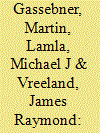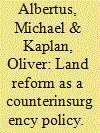|
|
|
Sort Order |
|
|
|
Items / Page
|
|
|
|
|
|
|
| Srl | Item |
| 1 |
ID:
120122


|
|
|
|
|
| Publication |
2013.
|
| Summary/Abstract |
What determines the emergence and survival of democracy? The authors apply extreme bounds analysis to test the robustness of fifty-nine factors proposed in the literature, evaluating over three million regressions with data from 165 countries from 1976 to 2002. The most robust determinants of the transition to democracy are gross domestic product (GDP) growth (a negative effect), past transitions (a positive effect), and Organisation for Economic Co-operation and Development membership (a positive effect). There is some evidence that fuel exporters and Muslim countries are less likely to see democracy emerge, although the latter finding is driven entirely by oil-producing Muslim countries. Regarding the survival of democracy, the most robust determinants are GDP per capita (a positive effect) and past transitions (a negative effect). There is some evidence that having a former military leader as the chief executive has a negative effect, while having other democracies as neighbors has a reinforcing effect.
|
|
|
|
|
|
|
|
|
|
|
|
|
|
|
|
| 2 |
ID:
120123


|
|
|
|
|
| Publication |
2013.
|
| Summary/Abstract |
Can targeted land reform reduce levels of civil war conflict by mitigating the factors that contribute to rural rebellion? This article uses new micro-level data on land reform and insurgency at the municipal level from Colombia from 1988 to 2000, a country with high rates of land inequality and informal land ownership, to test whether land reform undercut subsequent guerrilla activity. The reform had two distinct aspects. Politically powerful large landholders blocked most large-scale reform, which resulted primarily in an enduring, low-intensity, and geographically dispersed reform that spurred low levels of insurgent activity. Larger-scale reforms were only implemented in areas that threatened serious violence and had the potential to harm elite interests, and in these limited areas reform reduced guerrilla activity. This suggests that while land reform can be an effective counterinsurgency policy, it may be politically difficult to implement at a sufficient scale because it threatens the status quo.
|
|
|
|
|
|
|
|
|
|
|
|
|
|
|
|
| 3 |
ID:
120127


|
|
|
|
|
| Publication |
2013.
|
| Summary/Abstract |
Environmentalists often urge their home countries to take a leading role in reducing global environmental problems like climate change. A pertinent question is, Will examples set by leading nations influence others to follow suit, and if so, do the costs of leading matter? For instance, will costly domestic reductions have a stronger effect on followers than purchases of cheap emission permits abroad? To investigate these questions, we have conducted two treatments in a public bad experiment in which leaders have different costs of leading. Our findings suggest that higher costs of leading lead to stronger effects of a given leader example. Randomly chosen leaders lead by example and set better examples if it is less costly to do so. Finally, there seems to be a limit to the leader effect and it may decrease over time.
|
|
|
|
|
|
|
|
|
|
|
|
|
|
|
|
| 4 |
ID:
120124


|
|
|
|
|
| Publication |
2013.
|
| Summary/Abstract |
The premise of the cultural congruence hypothesis is that the level of congruence between democratic values among the public and in political institutions of a country is an important indication of political stability: the greater the congruence, the greater the stability. Though this hypothesis was proposed almost fifty years ago, it has never been fully examined. A crucial weakness of the hypothesis is that it is blind to the direction of incongruence: instability increases if the public has either more or less freedom relative to their expectations. But based on what we learn from Prospect Theory, one may expect to find different behaviors in these two situations. The empirical analyses that follow confirm this expectation. The article also evaluates the congruence hypothesis in light of the institutional hypothesis. Rather than seeing these hypotheses as competing, the authors claim that it is more productive to focus on the interaction between them, thus improving their understanding of political stability.
|
|
|
|
|
|
|
|
|
|
|
|
|
|
|
|
| 5 |
ID:
120125


|
|
|
|
|
| Publication |
2013.
|
| Summary/Abstract |
Recent scholarship suggests that democracies tend to fight shorter conflicts that can be easily won. This is most likely due to the accountability incentives that constrain democratic leaders. Fearing removal from office, democratic leaders will try to choose short conflicts against weaker opponents. The authors question this argument by presenting an alternative explanation for the connection between democracy and shorter disputes and victories. Building on prior works that have identified a territorial peace, this article argues that democracies often have few territorial issues over which to contend. In fact, rarely do democracies have territorial disputes with their neighbors. Thus, democracies have less difficult issues to resolve, and this makes conflict escalation less likely against neighbors. Without neighbors ready to attack the homeland, states at territorial peace can more easily choose favorable conflicts to escalate. This logic applies to all states at territorial peace, of which democratic states are just a subset. Analyses of directed-dispute dyads between 1816 and 2001 provide confirmation for our argument. Regime type does not predict conflict selection or victory once controls are added for issue salience.
|
|
|
|
|
|
|
|
|
|
|
|
|
|
|
|
| 6 |
ID:
120128


|
|
|
|
|
| Publication |
2013.
|
| Summary/Abstract |
Surprisingly high levels of within-group cooperation are observed in conflict situations. Experiments confirm that external threats lead to higher cooperation. The psychological literature suggests proximate explanations in the form of group processes, but does not explain how these processes can evolve and persist. The authors provide an ultimate explanation, in which cooperation is a rational response to an external threat. In the model, groups vary in their willingness to help each other against external attackers. Attackers infer cooperativeness of groups from members' behavior under attack and may be deterred by a group that bands together against an initial attack. Then, even self-interested individuals may defend each other when threatened in order to deter future attacks. A group's reputation is a public good with a natural weakest-link structure. The model extends to cooperative and altruistic behavior in general.
|
|
|
|
|
|
|
|
|
|
|
|
|
|
|
|
| 7 |
ID:
120126


|
|
|
|
|
| Publication |
2013.
|
| Summary/Abstract |
This article tests the hypothesis that ordinary people favor punishing badly behaved foreign actors to make them "pay" for their crimes rather than purely to protect national security interests. In an undergraduate sample, people's endorsement of the principle of retributive punishment was related to their support for punishing transgressor states and their support for torturing detainees, controlling for partisanship, ideology, humanitarian and security values, and beliefs about the efficacy of force. The interstate transgression scenarios included a state sponsoring terror attacks against a rival, a nuclear proliferator, and a small, unnamed aggressor. Retributive dispositions were also strongly related to support for the death penalty, which helps explain prior findings that American death penalty supporters are unusually bellicose toward foreign wrongdoers.
|
|
|
|
|
|
|
|
|
|
|
|
|
|
|
|
|
|
|
|
|